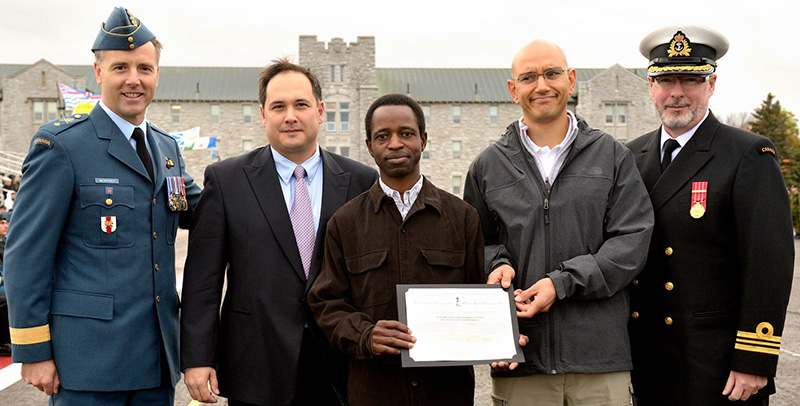
The Commandant of the Royal Military College, BGen Al Meinzinger, and four people who prepared accreditation questionnaires: Dr. Philippe Chang, PhD, from Civil Engineering, Dr. Kiari Goni Boulama, PhD, from Mechanical and Aerospace Engineering, Dr. Juan Beltran, PhD, from Chemical Engineering and LCdr Dean Morrissey from Electrical and Computer Engineering. Maj Paul Hungler from Chemical Engineering (absent) organised the visit.
By Officer Cadet Marion Agier
There are six programs in the Faculty of Engineering: aeronautical, chemical, civil, computer, mechanical and electrical. Each program has to be accredited by the Canadian Engineer Accreditation Board (CEAB). To receive this accreditation, every program has to fill a questionnaire about 600 pages long including the CV of every teacher, the transcript of each student (anonymously), the curriculum of each class, etc. Every program must demonstrate that their graduates possess a number of important attributes also referred to as Graduate Level Expectations. A large team of external visitors came to the College, one per program plus three others, for a total of nine. They spent three day here in November 2012 to validate the questionnaire and the quality of the university environment. They conducted interviews with teachers, students, the Dean, the Commandant, and they inspected the library and the technical resources. Following this very strict review, they wrote a report to the Accreditation Committee commenting on the quality of the education received by all engineers at the Royal Military College. The CEAB`s final recommendations were very positive. They suggested a few improvements to upgrade the safety of the labs and the pedagogical approach related to design. All programs received the maximal accreditation of 6 years.
In addition to the CEAB, the Faculty of Engineering has to pass the provincial Institutional Quality Assurance Process or IQAP, like all other programs at other universities in Ontario. Technically, the College doesn't have to undergo the IQAP cyclical review, because we don't receive any money from the provincial government; however these reviews are important to show the excellence of our teachers and our facilities. The Faculty of engineering, therefore, underwent the two reviews at once to "Kill two birds with one stone", according to Dr. Bates, Dean of engineering. For the additional IQAP review, the College had to add six more people to the visit - these were professors from non-engineering departments at RMC.
In addition to the IQAP/CEAB visits every six years, these review processes mandate an annual quality control process to ensure that our programmes are continually improving. These cyclic reviews validate the quality of the academic experience at the College and assure all concerned that the education received by our cadets is second to none. To conclude, it is important to mention that it is the first time that the College was able to fully showcase all the benefits of a Military college during a CEAB accreditation visit. Normally, these visits only assess the academic component, however, this year the Engineering team was able to also incorporate the bilingualism, athletics and leadership pillars. It thus demonstrated that RMC clearly has an Engineering Programme with a Difference.